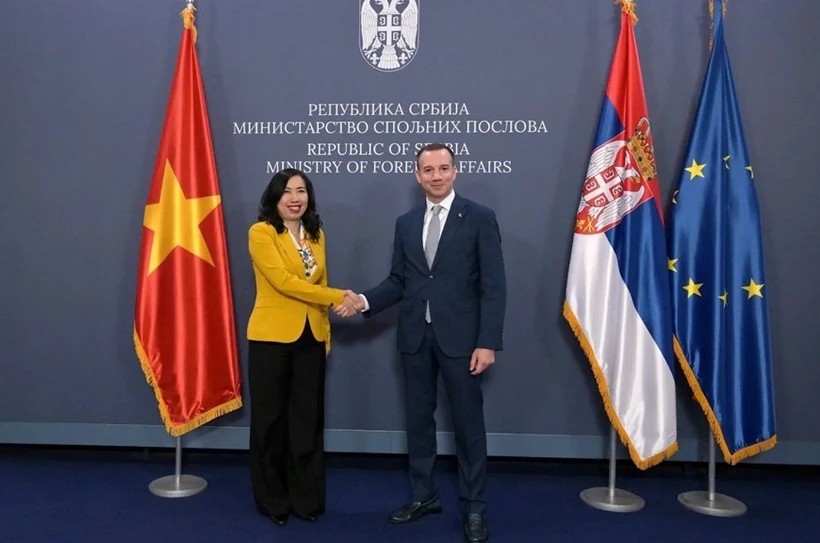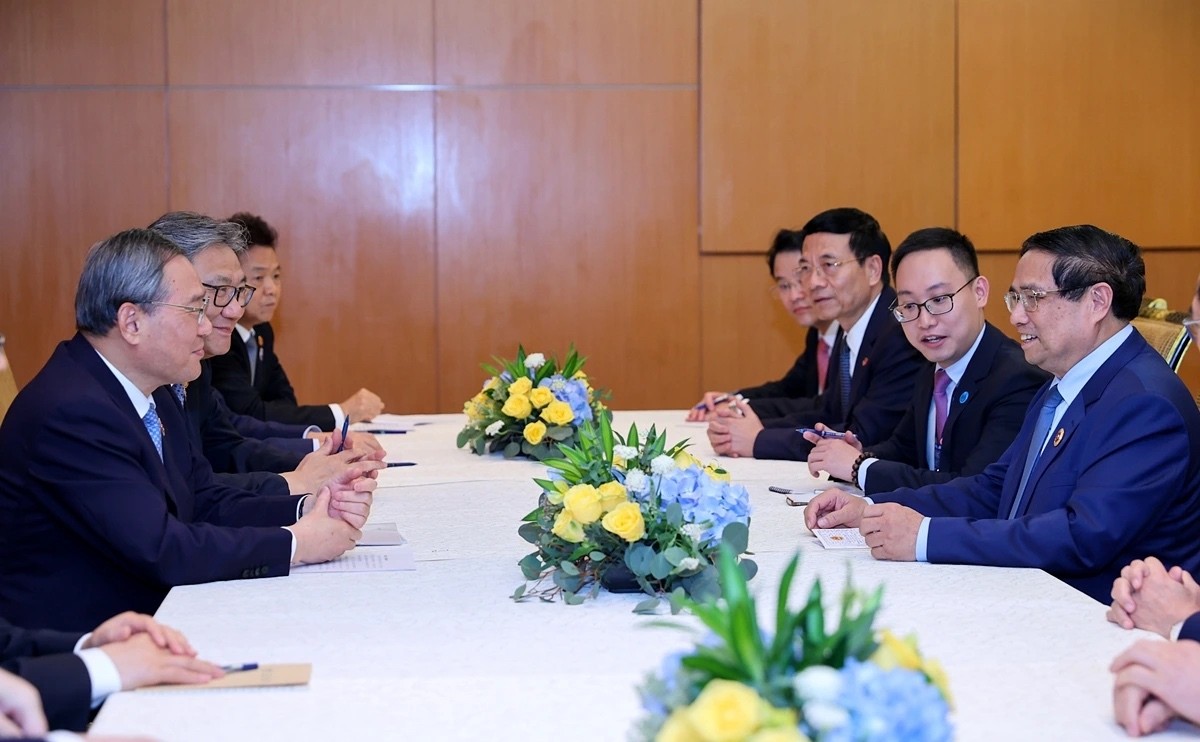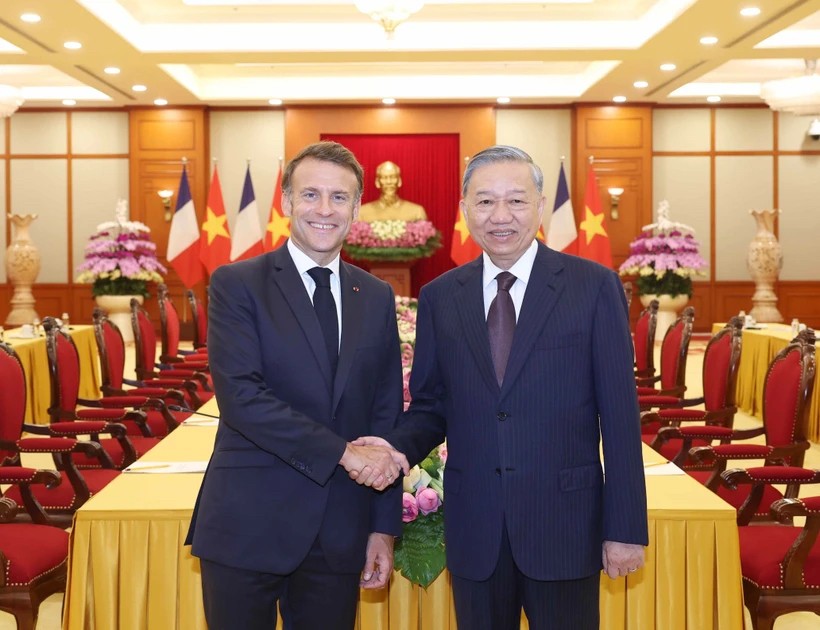| Vietnam News Today (Dec. 27) notable headlines Vietnam, RoK sign mutual recognition agreement on authorized economic operator Vietnam, Russia hold seventh Defense Strategy Dialogue Da Nang strengthens high-tech training links with Japanese localities Vietnam’s tourism booms in 2024: Time for bold changes Singaporean media outlet highlights Vietnamese renewable energy sector State President hosts new ambassadors of Cuba, Zimbabwe, Bolivia International media positive on bright future of Vietnamese economy Cambodia, Vietnam seek broader cooperation in e-commerce and digital economy Vietnam-Russia Comprehensive Strategic Partnership yields impressive results in 2024 |
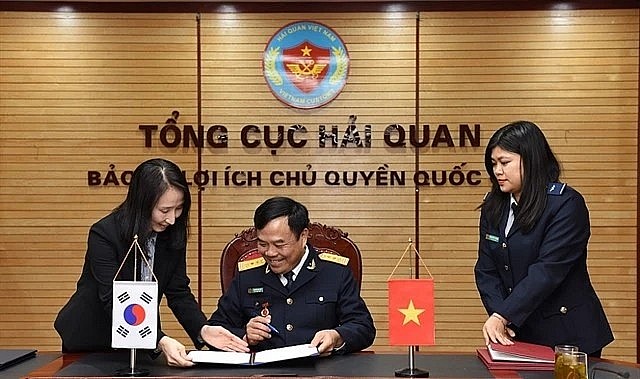 |
| The General Department of Vietnam Customs and the Republic of Korea Customs Service sign a mutual recognition agreement. (Photo: baodautu.vn) |
Vietnam, RoK sign mutual recognition agreement on authorized economic operator
The General Department of Vietnam Customs and the Republic of Korea (RoK) Customs Service have signed a mutual recognition agreement (MRA) on authorized economic operators (AEO).
Upon signing and implementing the AEO MRA, the parties will complete the necessary domestic procedures to establish the legal framework.
According to Vietnam Customs, the MRA aligns with global trends and brings numerous business benefits while enhancing customs management efficiency. The primary goal is to provide long-term advantages for enterprises.
Many customs administrations perform AEO mutual recognition as an effective approach to enhancing competitive advantage, creating a transparent and proactive environment for international businesses and shortening customs clearance time. It also saves trade compliance costs and supports production promotion while ensuring security and safety for the global supply chain.
Vietnamese priority enterprises will enjoy preferential treatment under domestic regulations and benefit from the privileges stipulated in the AEO MRA with the partnering country, cited VNA.
This is a significant advantage, fostering economic development and international integration and elevating Vietnam Customs’ stature. Moreover, it attracts domestic enterprises to join the priority programme, improving compliance within the business community.
Additionally, the MRA facilitates the effective implementation of provisions in the Vietnam - RoK Free Trade Agreement (VKFTA) and the World Trade Organisation's Trade Facilitation Agreement.
The ROK is one of Vietnam’s most vital partners across various sectors, including politics, investment, trade, industry, energy and tourism.
Within the scope of bilateral trade cooperation, the signing of the MRA between the customs authorities reflects the enduring political trust and reinforced collaboration between the two nations.
This MRA expands areas of cooperation, establishes a long-term and substantive collaborative mechanism, and deepens economic and trade relations.
As of August 2024, the RoK has 935 AEOs involved in export-import activities, logistics and port operations, contributing about 50% of the country’s export turnover and 70% of its import turnover.
In Vietnam, by the same period, there are 76 AEOs, accounting for over 30% of its total export-import turnover.
According to the World Customs Organisation (WCO), an authorised economic operator (AEO) is a party involved in the international movement of goods in whatever function that has been approved by or on behalf of a national customs administration as complying with WCO or equivalent supply chain security standards.
Vietnam, Russia hold seventh Defense Strategy Dialogue
Deputy Minister of National Defense Senior Lieutenant General Hoang Xuan Chien and his Russian counterpart Alexander Fomin co-chaired the 7th Vietnam - Russia Defense Strategy Dialogue on December 26 in Hanoi.
At the event, Chien highlighted the important pillar role of defense cooperation in the overall traditional friendship and comprehensive strategic partnership between Vietnam and Russia, while hailing the results of defense cooperation that the two countries' defense ministries have achieved since the previous dialogue held last July.
Accordingly, the two sides have yielded many positive results through cooperation in such areas as exchanging delegations at all levels; effectively maintaining existing cooperation mechanisms; promoting staff training, cooperation between armies, services and units of the two defense ministries; scientific research cooperation within the framework of the Vietnam - Russia Tropical Center; cooperation in news agencies, military television, military history, military museums; cooperation in multilateral activities, and coordination at international multilateral mechanisms and forums on national defense.
Promoting the above results, Senior Lieutenant General Hoang Xuan Chien suggested both sides continue to step up greater efforts to make bilateral defense cooperation more substantive and effective in the coming time by intensifying delegation exchange at all levels, especially high-level delegations; promoting the effectiveness of important cooperation mechanisms such as the Intergovernmental Coordination Committee on the Vietnam - Russia Tropical Center, and the Defense Strategy Dialogue.
The efforts include continuing to strengthen cooperation between military and service branches; training in military medicine and Russian language; supporting the Vietnamese Ministry of National Defense in realizing the contents of the dossier on 70 years of defense cooperation between Vietnam - the Soviet Union/Russian Federation, according to VOV.
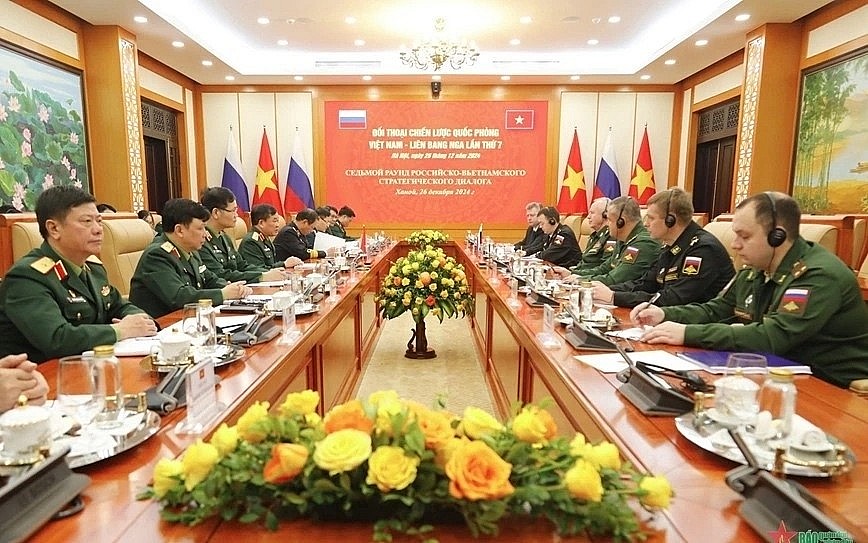 |
| At the 7th Vietnam - Russia Defense Strategy Dialogue (Photo: qdnd.vn) |
Chien expressed his confidence that the results of the 7th Vietnam - Russia Defense Strategy Dialogue will give extra impetus to the two defense ministries to implement increasingly substantive, effective and practical defense cooperation. For his part, Alexander Fomin congratulated the Vietnamese Ministry of Defense on the occasion of the 80th anniversary of the Vietnam People's Army and the 35th anniversary of the All-People National Defense Day.
Acknowledging the positive outcomes in defense cooperation between the two defense ministries in recent times, the Russian Deputy Defense Minister highlighted defense cooperation as a pillar in the countries’ diplomatic relations.
Alexander Fomin stated that 2024 marks the 30th anniversary of the 30th anniversary of the signing of the 'Treaty on Principles of Friendly Relations between the Socialist Republic of Vietnam and the Russian Federation' (1994 - 2024).
2025 will mark the 75th anniversary of the two countries’ diplomatic relations and the 80th anniversary of the Great Patriotic Victory of the Soviet people. Senior Lieutenant General Alexander Fomin affirmed that this victory had the participation and assistance of Vietnamese friends, while emphasizing the close-kit friendship and mutually beneficial cooperation between the defense ministries.
In the coming time, the Russian Ministry of Defense will continue to actively coordinate with its Vietnamese counterpart to implement agreed work, thereby deepening Vietnam-Russia defense links in an effective and substantive manner, he added.
At the dialogue, the two sides shared their views on the world and regional situation of mutual concern. Deputy Minister Hoang Xuan Chien emphasized that Vietnam consistently pursues a foreign policy of independence, self-reliance, peace, friendship, cooperation, development, multilateralization and diversification of foreign relations.
He also assured Vietnam’s readiness to cooperate with countries and international organizations for peace, cooperation and development in the region and the world. The nation persistently struggles to resolve all disputes and disagreements by peaceful means on the basis of international law, including the 1982 United Nations Convention on the Law of the Sea. Regarding defense policy, Vietnam consistently adheres to the "four no's" defense policy, Chien emphasized.
At the end of the dialogue, the two sides signed two documents which serve as a foundation for both defense ministries to realize cooperation in the time ahead.
Da Nang strengthens high-tech training links with Japanese localities
Within the framework of the comprehensive strategic partnership between Vietnam and Japan, the central coastal city of Da Nang is ramping up efforts to promote study abroad programmes and high-tech workforce training with Japanese localities, Vice Chairwoman of the municipal People’s Committee Nguyen Thi Anh Thi has said.
According to the official, the central economic hub has so far established cooperative ties with 49 localities across 22 countries and territories, including Japan. It has signed memoranda of understanding to establish official friendship and cooperation with four Japanese cities, namely Kawasaki, Sakai, Yokohama, and Kisarazu. Additionally, its partnerships extend to 15 other Japanese localities, such as Nagasaki, Shizuoka, Fukuoka, Mitsuke, and Otawara.
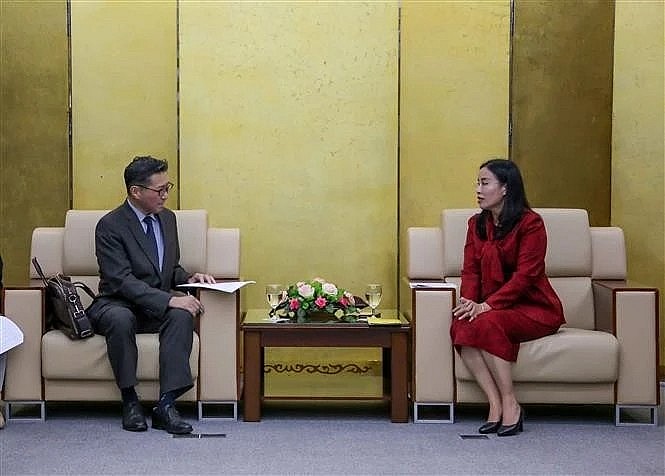 |
| Vice Chairwoman of the Da Nang People's Committee Nguyen Thi Anh Thi (right) receives Japanese Consul General to the city Mori Takero. (Photo: VNA) |
In 2024, under policies aimed at developing high-quality human resources in the public sector, Da Nang sent six trainees for undergraduate studies and numerous others for short-term medical training in Japan. Currently, six secondary and high schools in the city include Japanese in their curriculum, while 30 Japanese language training centres operate there, two of which are funded by Japanese educational organisations. Furthermore, Da Nang is home to 25 companies specialising in recruitment and organising overseas education programmes in Japan.
The Northeast Asian country remains a top destination for students from Da Nang. In the first half of this year, 223 students travelled to Japan for educational purposes, a significant increase from 137 in 2023, VNA reported.
Beyond education, the coastal city has actively pursued trade promotion and partnerships with Japan, which leads in registered investment capital in Da Nang with over 1.14 billion USD across 261 projects. In 2023, the city’s export and import turnovers to Japan were estimated at 650 million USD and 350 million USD, respectively.
Vietnam’s tourism booms in 2024: Time for bold changes
Vietnam’s tourism sector welcomed over 17 million international visitors in 2024, marking a remarkable recovery but also highlighting the need for decisive reforms to sustain growth.
A remarkable recovery
Vietnam welcomed approximately 17.5–18 million international tourists in 2024, a 35% increase compared to 2023 and nearly 95% of the pre-pandemic 2019 figures.
Domestic tourism also thrived, with 110 million visitors contributing to total revenue of approximately 840 trillion VND ($35 billion).
Asia remained Vietnam’s primary market, accounting for nearly 80% of international arrivals. Visitors from Northeast Asian countries and territories - China, South Korea, Japan, and Taiwan - made up nearly 60% of the total.
The implementation of relaxed visa policies in August 2023, including extended stays of up to 45 days, spurred growth, particularly from European markets. Visitors from the UK, France, Germany, and Italy showed impressive increases of 20–57%.
Nguyen Chau A, CEO of Oxalis Travel, highlighted that while Vietnam’s tourism has largely recovered, certain markets have exceeded 2019 levels.
He attributed this to a combination of open visa policies and promotional efforts, such as international music and film events and digital marketing campaigns.
However, the majority of international arrivals - 8 million - were from China and South Korea, followed by 5 million from Europe and North America. This market diversity reduces dependence on a single region, a positive sign for long-term stability.
Challenges from regional competitors
Despite these gains, Vietnam lags behind competitors like Thailand. For instance, Thailand welcomed 35 million international tourists in 2024, generating $85.3 billion in revenue, nearly triple Vietnam’s figures.
Strategic policies, such as multiple visa exemptions and extended stays for key markets like China and India, contributed to Thailand’s success, cited VNN.
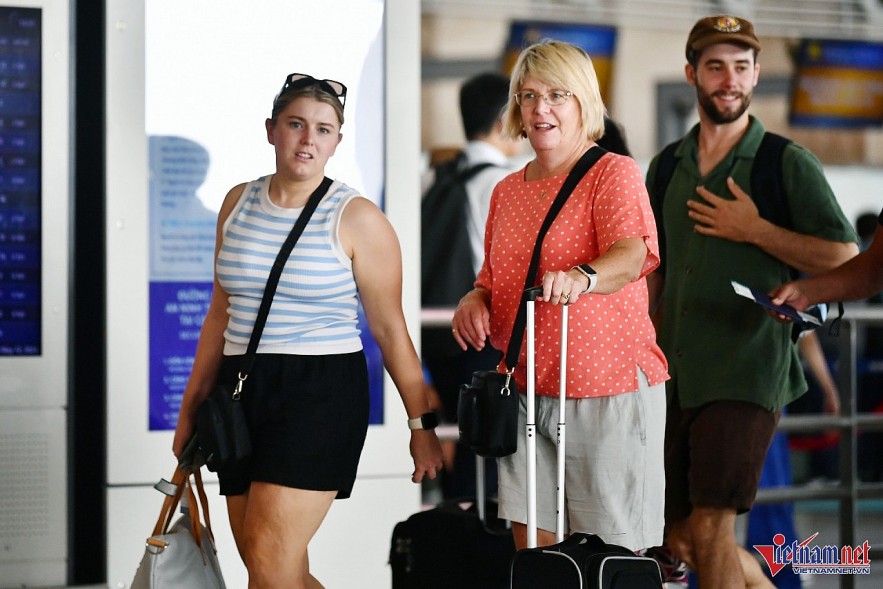 |
| Vietnam welcomed a surge in international tourists, with over 17 million arrivals in 2024. (Photo: Hoang Ha) |
Infrastructure remains a significant hurdle for Vietnam. Overcrowded airports like Tan Son Nhat and Noi Bai result in long delays, deterring potential visitors.
While expanding direct flights to destinations like Da Nang, Quang Nam, and Khanh Hoa has eased some pressure, Vietnam still lacks integrated hubs offering seamless travel experiences.
Nguyen Duc Chi, a former tourism official in Ho Chi Minh City, emphasized that visa reforms, while essential, are only part of the equation. “The true game-changer lies in addressing infrastructure bottlenecks and improving the overall travel experience. Tourists may want to visit, but logistical issues make it difficult to capitalize on demand,” he said.
The need for bold innovation
Beyond infrastructure, Vietnam must develop more diverse and appealing tourism products, particularly for Western visitors.
While attractions like Ba Na Hills and Phu Quoc cater well to Asian tourists, offerings for European and American travelers remain limited.
Adventure tourism in Quang Binh and trekking routes in Ha Giang are exceptions but lack the scale to meet growing demand.
According to Nguyen Chau A, creating unique, high-quality tourism products tailored to specific markets is vital. "Tourism must evolve. We need fresh, compelling attractions to keep pace with changing visitor preferences," he stated.
Experts also stressed the importance of a national tourism strategy. This would include market analysis, product development tailored to target audiences, and coordinated promotional campaigns to position Vietnam as a premier global destination.
2025: A year for transformation
Looking ahead, 2025 is set to be a transformative year for Vietnam’s tourism sector. The industry aims to fully recover to pre-pandemic levels, with targets of 22–23 million international visitors, 130 million domestic tourists, and contributions of 6–8% to GDP. The sector also plans to create 5.5 million jobs.
To achieve these ambitious goals, Vietnam must address its existing bottlenecks with decisive action, from infrastructure upgrades to bold policy innovations.
The country’s natural beauty, rich culture, and warm hospitality remain its strongest assets, but turning potential into performance requires sustained investment and strategic vision.
Singaporean media outlet highlights Vietnamese renewable energy sector
Media outlet eco-business.com of Singapore published an article on December 26 to highlight the recent revised Electricity Law which has promoted increasing optimism in the Vietnamese renewable energy sector.
The newswire quoted Mark Hutchinson, director of the Southeast Asia taskforce at industry group Global Wind Energy Council (GWEC), as saying that there remains a lot of work to do, although the sentiment in the industry is much more positive than it was eight months ago, or certainly a year ago.
Meanwhile, Thomas Jakobsen, managing director of Singapore-based renewable power producer and developer Indochina Energy Partners, said he was “very happy” with the tempo of regulations, which is “as good as I have seen in 20 years in Vietnam”.
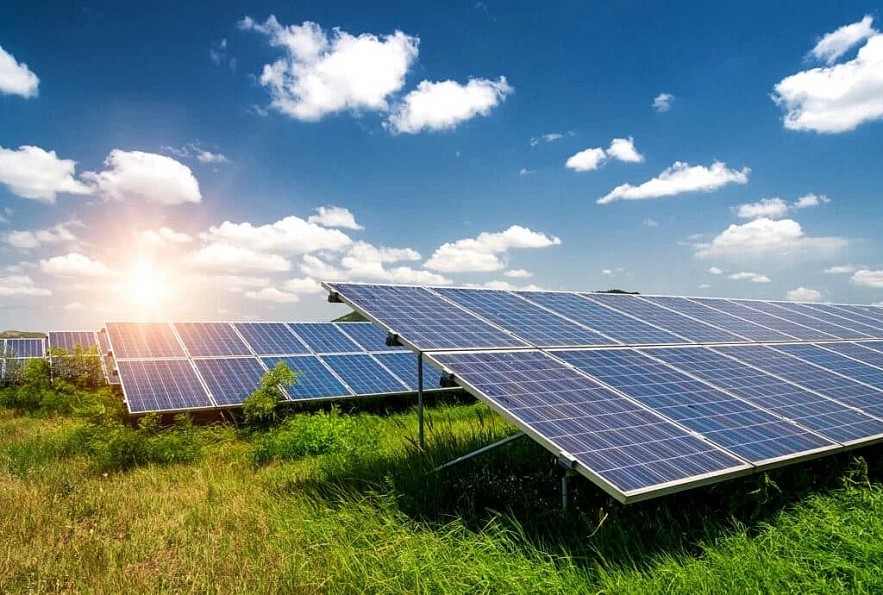 |
| Photo: VOV |
The media outlet points out that the latest Vietnamese electricity law, which takes effect from 2024, solves concerns not only relating to the solar and wind sectors, but also includes rules aimed at facilitating the use of fuels such as natural gas and hydrogen.
The article outlines that nuclear power development once again features in the wording, after being left out of the earlier iteration published in 2004.
Updates have been billed as important for energy security, although there are questions over whether Vietnam can attend to all the different sectors at once, according to the article.
Observers noted that the nation is taking a more deliberate approach with managing its energy sector following spells of volatility during the previous years.
“We are seeing caution in the government approach, which is understandable. And they are not going to let that happen again, which is the right thing to do,” said Hutchinson.
“Next year is going to be about finalising the DPPA (direct power purchasing agreements) regulations and charges, working to build all the decrees and circulars under the Electricity Law, and moving the Electricity of Vietnam (EVN) and Vietnam National Oil and Gas Group (PVN) projects forward. So it is going to be less about high-level policy and more about implementation,” he added.
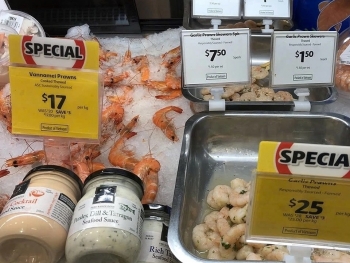 | Vietnam News Today (Dec. 23): More Opportunities to Increase Vietnam – Australia Economic Cooperation Vietnam News Today (Dec. 23): More opportunities to increase Vietnam – Australia economic cooperation; Energy cooperation constitutes bright spot in Vietnam-Qatar relations; Vietnamese soldiers mark ... |
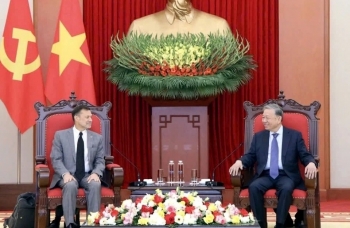 | Vietnam News Today (Dec. 24): Vietnam Desires to Foster Strong Partnership With Australia Vietnam News Today (Dec. 24): Vietnam desires to foster strong partnership with Australia; Vietnam seen as favorite New Year destination for int’l travelers: Agoda; Storm ... |









